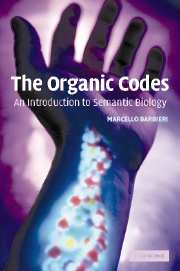Book contents
- Frontmatter
- Contents
- Foreword
- Dedication
- Acknowledgements
- Introduction
- Chapter 1 The microscope and the cell
- Chapter 2 Theories of evolution
- Chapter 3 A new model for biology
- Chapter 4 Organic codes and organic memories
- Chapter 5 The origin of life
- Chapter 6 Prokaryotes and eukaryotes
- Chapter 7 The Cambrian explosion
- Chapter 8 Semantic biology
- Chapter 9 A brief summary
- Appendix: Definitions of life
- Afterword
- References
- Index
Chapter 5 - The origin of life
Published online by Cambridge University Press: 23 November 2009
- Frontmatter
- Contents
- Foreword
- Dedication
- Acknowledgements
- Introduction
- Chapter 1 The microscope and the cell
- Chapter 2 Theories of evolution
- Chapter 3 A new model for biology
- Chapter 4 Organic codes and organic memories
- Chapter 5 The origin of life
- Chapter 6 Prokaryotes and eukaryotes
- Chapter 7 The Cambrian explosion
- Chapter 8 Semantic biology
- Chapter 9 A brief summary
- Appendix: Definitions of life
- Afterword
- References
- Index
Summary
New theories on the origin of life appear at almost regular intervals in the scientific literature, thus creating the impression that there are virtually endless solutions to the problem. In reality most theories are but variations on two basic themes: the metabolism-first paradigm proposed by Oparin and the replication-first paradigm of J.B.S. Haldane. This is because every organism is conceived as a duality of genotype and phenotype (software and hardware), and since a sudden appearance of such a system would be little short of a miracle, there seemed to be no choice but to start either from primordial genes or from primordial proteins. In 1981, however, I proposed that an alternative does exist, because the cell is not a duality but a trinity of genotype, phenotype and ribotype. And the ribotype has a logical and a historical priority over genotype and phenotype. At the end of the chapter this proposal is illustrated with a metaphor that compares the cell to a city, where proteins are the houses and genes are their blueprints. The traditional paradigms would ask “Which came first, the houses or the blueprints?” while the ribotype theory amounts to saying that “It was the inhabitants who came first. It was they who made houses and blueprints.” The aim of this chapter, in short, is to present an overview of all paradigms on the origin of life: the gene-first, the protein-first and the ribotype-first approach.
- Type
- Chapter
- Information
- The Organic CodesAn Introduction to Semantic Biology, pp. 121 - 162Publisher: Cambridge University PressPrint publication year: 2002



